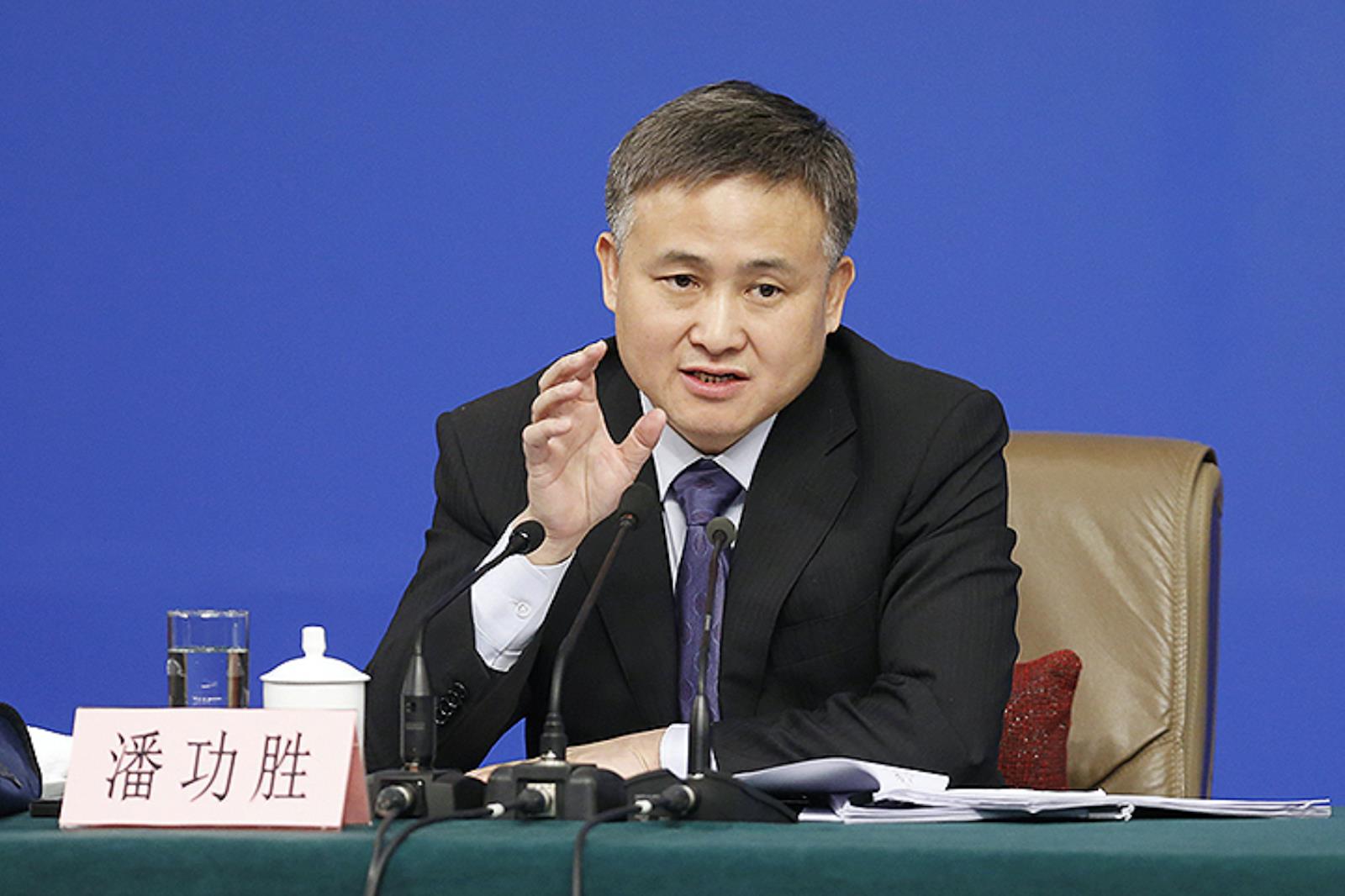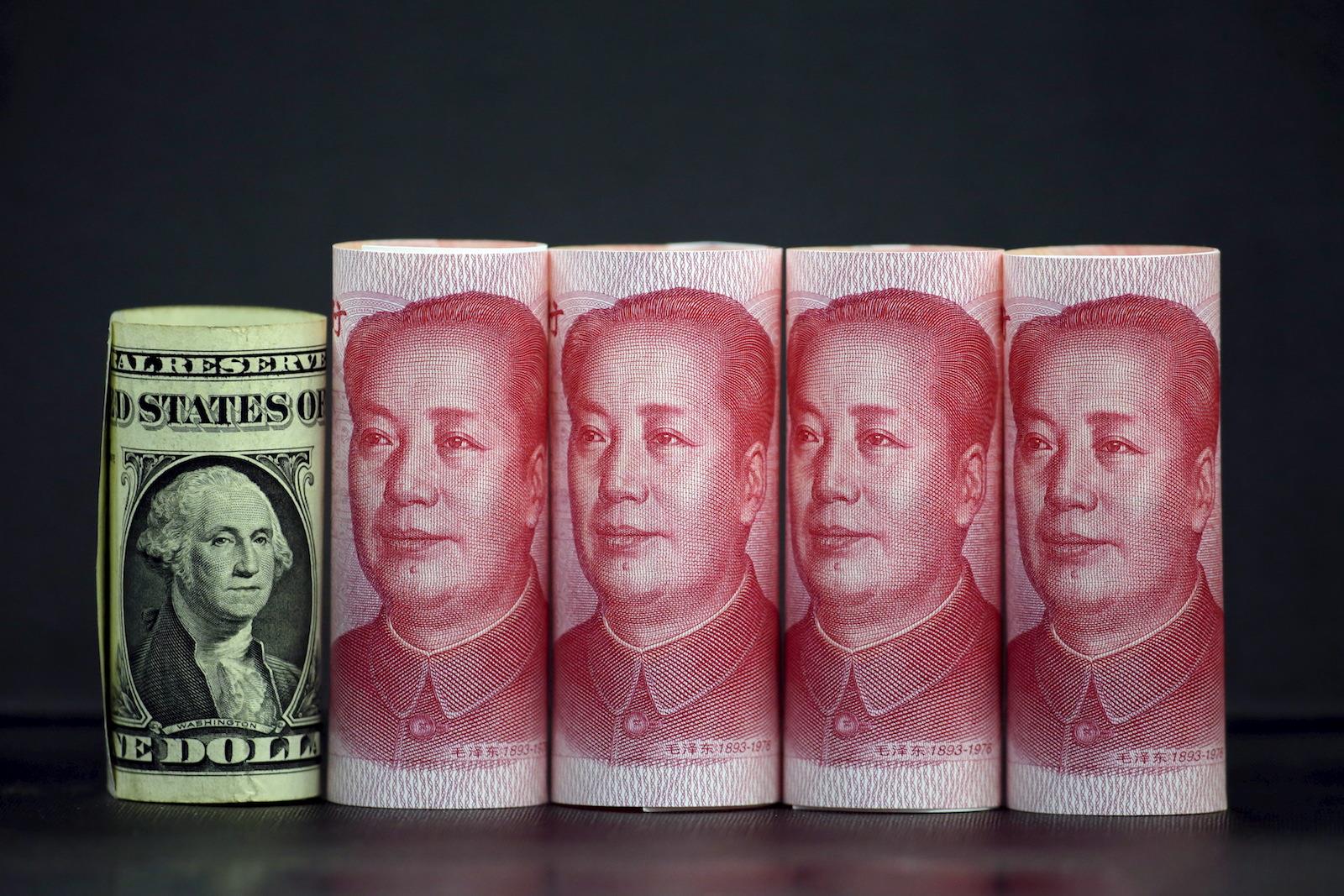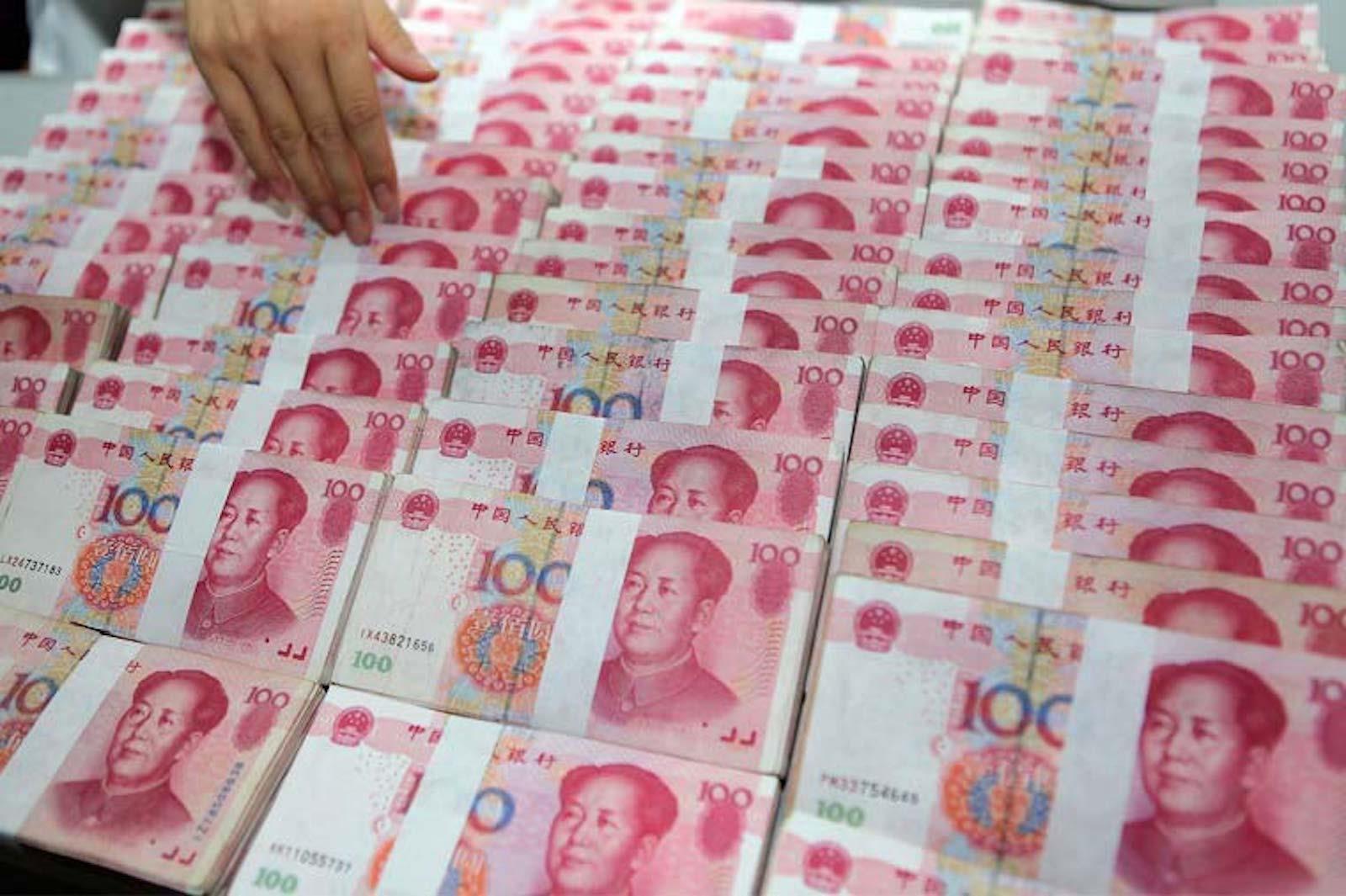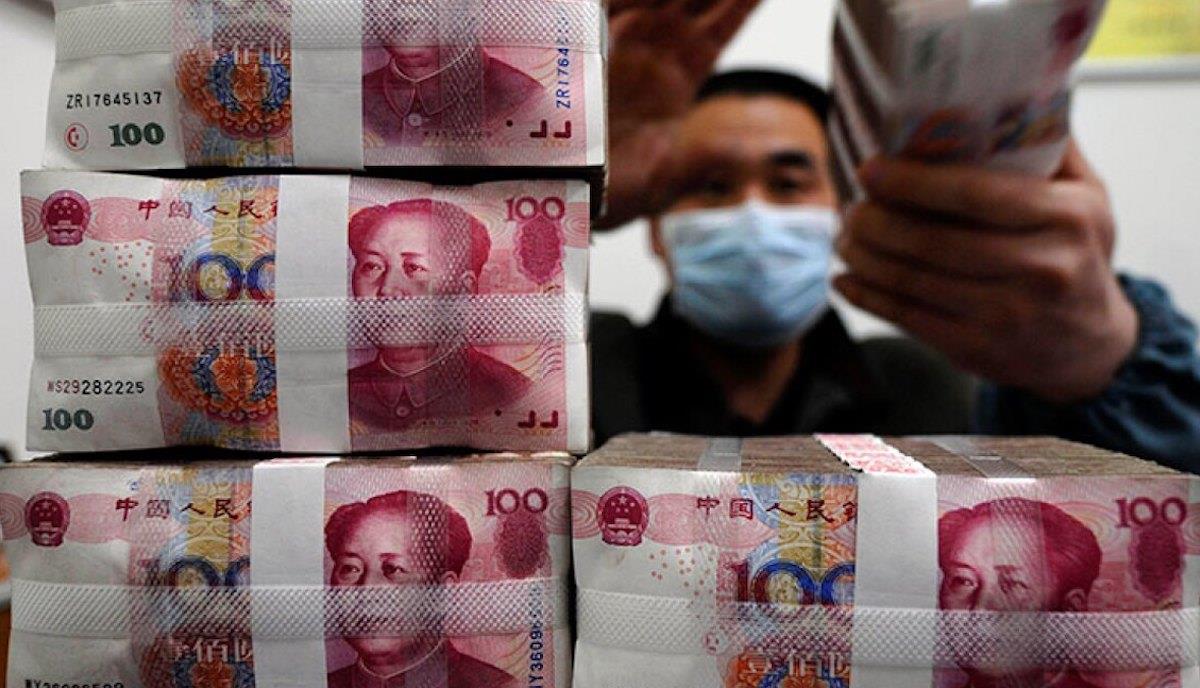
Yuan Internationalization Drive Hits A Local Speed Bump
New data from the People's Bank of China (PBOC) suggest corporate chieftains are dragging their feet on converting foreign-exchange earnings into local currency.
In March, FX deposits rose to
US$833 billion
from $779 billion a month earlier, signaling that businesses are slow-walking moves to swap earnings into their home currency.
The most obvious explanation: higher offshore interest rates that are contributing to a weaker-than-expected yuan.
“This huge positive yield spread is not evaporating anytime soon,” says Alvin Tan, currency strategist at RBC Capital Markets.
The rate differential between the US and China is the most positive since 2007.“This powerful fundamental fact,” Tan notes,“is enough to explain why Chinese exporters are reluctant to exchange dollars for yuan.”
It's also another reason for Beijing's currency managers to resist the urge to chase a falling yen downward in the months ahead. It might backfire in ways that run counter to Xi's grand vision for“yuanization.”
Granted, Xi and Premier Li Qiang have so far resisted the urge to devalue. But as Asia's biggest economy hits intensifying headwinds, a weaker exchange rate could be just the thing to juice exports and ensure gross domestic product (GDP) stays near 5% and deflationary pressures remain in check.
There are myriad reasons why Team Xi and PBOC Governor Pan Gongsheng have not chased the yen lower.

People's Bank of China Governor Pan Gongsheng faces a currency dilemma. Image: Twitter Screengrab
For one thing, it would make it harder for property development giants to make offshore bond payments, raising the odds of more China Evergrande Group-like defaults. For another, it could make China an even bigger flashpoint ahead of the November 5 US election.
The biggest worry, though, is damaging Xi's long-term priority to internationalize China's currency as an alternative to the US dollar.
To be sure,“it appears that China's expanding trade ties and financial infrastructure suggest that the potential for further yuanization has not been exhausted,” says Dmitry Dolgin, economist at ING Bank.
Yet Xi's balancing act is becoming more difficult as the yen slides to 34-year lows. The yen's 9.7% drop this year alone isn't making Beijing's life easier as it struggles to stabilize consumer prices.
Faster GDP also might give Xi's reform team greater latitude to address China's property crisis, reduce record youth unemployment and tame runaway local government borrowing.
When Fitch Ratings downgraded China's sovereign credit rating to“negative” from“stable” earlier this month, it listed local and regional governments' financial strains among its biggest worries.
Municipalities, Fitch said,“have been affected by the property slowdown and some local government financing vehicles (LGFVs) are facing refinancing pressures.”

Iran's North Koreanization gambit

China closing in on laser-propelled fast, stealth subs
In the past year, Fitch added,“some highly indebted regions were permitted to issue about CNY1.4 trillion ($193.5 billion) in refinancing bonds to bring LGFV debt directly onto their balance sheets. We expect such issuance to continue in 2024.”
So far, banks have been requested to support LGFV debt structures through restructurings, while local asset management companies have also stepped in with support, Fitch notes.
China's Ministry of Finance pushed back, asserting that“Fitch ratings don't effectively reflect prospectively the positive effects of fiscal policy on driving economic growth and thereby stabilizing macro leverage.”
Finance Minister Lan Fo'an's team argues that China's GDP is growing around 5.3%, contributing more than 30% to world output.
As such, Beijing claims,“the long-term positive trend of China's economy has not changed, nor has the Chinese government's ability and determination to maintain good sovereign credit.”
Even so, global investors and central banks aren't loading up on yuan assets the way Xi's government likely hoped.
One reason is the US dollar's stubborn strength. In February, foreign holdings of US Treasury securities surged to a record - and a fifth straight monthly rise - despite Washington's national debt hitting $35 trillion.

The dollar is still in favor as a global reserve currency. Photo: Agencies
Overseas purchases of US government debt jumped 8.7% in February alone to $7.965 trillion, up from $7.945 trillion in January as Belgium, Japan, the UK and other top economies loaded up on dollars.
This dollar-hoarding is more than offsetting Beijing's efforts to reduce US holdings. In February, China's stockpile of Treasuries dropped $22.7 billion to $775 billion.
Dollar buying also confounds broader efforts by the BRICS economies to marginalize the globe's reserve currency.
The governments of Brazil, Russia, India, China and South Africa haven't been quiet about“de-dollarization” efforts, with an important assist from Saudi Arabia and other OPEC+ members.
Given China's scale and role as the top trading nation, a pivot from dollars to yuan seems like the most obvious changing-of-the-guard option.
Hence the BRICS alliance's determination to dethrone the dollar by convincing developing countries to use local currencies for trade
and finance instead.
Efforts by US President Joe Biden's administration to damage China's tech industry and“weaponize” the dollar as part of policies to retaliate against Russia for its invasion of Ukraine have only intensified this determination.
Germany's Finance Minister Christian Lindner warns that the freezing of Russian assets amid Ukraine tensions could undermine international financial stability and sovereign immunity.
“If third parties have the impression that their sovereign assets are not safe under certain circumstances, international financial stability could be jeopardized,” Lindner says.“We would lose more than we would gain in the long run.”
Yet the ditch-the-dollar enterprise seems to have lost momentum, at least for now, as the dollar continues to advance. This month, the
DXY index , a key measure of dollar strength, is up nearly 5% so far this year.
One reason the dollar is confounding the BRICS is the durability of the“higher-for-longer” era for US yields. The Federal Reserve was tipped to slash interest rates between five and seven times this year. Now, as inflation proves less transient than hoped, markets wonder if the Fed will ease at all.
Lawrence Summers, the former US Treasury secretary, even wonders if the next move by Chairman Jerome Powell's Fed might be to hike rates instead. This about-face is contributing to the yen's plunge and keeping the yuan under downward pressure.
The yuan isn't alone. India's rupee recently dropped to an all-time low versus the US dollar. Malaysia's ringgit is trading near its lowest levels since the 1997-98 Asian financial crisis. Fears of further declines in the Philippine peso have led the central bank to delay rate cuts.
This month, as the International Monetary Fund and World Bank hosted their spring meeting, IMF Managing Director Kristalina Georgieva warned the dollar's strength has emerging economies struggling to stem big capital outflows.
“Higher interest rates for the rest of the world is not great news,” Georgieva explains.“Higher interest rates make the US more attractive so financial flows come here and that leaves the rest of the world somewhat struggling.”
Georgieva concludes that“if it continues for a long time, it could become a bit of a worry in terms of financial stability.”
In March, IMF data showed the US dollar accounted for almost 60% of all global foreign reserves. The currency's share of global foreign reserves actually rose 0.2 percentage points in 2023.
Yet Xi seems as determined as ever to increase the yuan's global stature.
In 2016, Xi's efforts to strengthen the financial system and increase transparency paid off when the yuan was welcomed into the International Monetary Fund's“special-drawing rights” program.
Joining the most exclusive currency basket along with the dollar, yen, euro and pound boosted trust in the yuan.

Sign up for one of our free newsletters
- The Daily ReportStart your day right with Asia Times' top stories AT Weekly ReportA weekly roundup of Asia Times' most-read stories
Its use in trade and finance has grown steadily since then. That increasing role earned Chinese government bonds a central place in bond benchmarks like FTSE-Russell's and in MSCI's stocks indexes and others.
Yet the yuan's softness risks reducing the appeal of Chinese assets. So do perceptions that
Xi's next five years may put his ambitions for greater control over increasing Chinese
competitiveness and transparency.
The odds are still good that the yuan's global role will grow exponentially as China modernizes its economy. Yet signs that China Inc is having doubts about the yuan's trajectory suggest Xi's de-dollarization drive is working better overseas – in terms of trade and official aid – than among Chinese companies.
One answer is for Xi and Li to step up reforms for the property sector, local government finances, capital markets development and recalibrating growth engines from exports to services and innovation. Beijing must also make the yuan fully convertible to increase global trust.

China's yuan still has a trust problem. Photo: Facebook Screengrab
The problem, says Alexandra Prokopenko, a senior fellow at the Carnegie Russia Eurasia Center, is that“it's believed that the yuan can't become a full-fledged reserve currency because of the current restrictions on capital transactions in China.”
Though growing yuan use by Russia and other sizable economies is“helping the Chinese authorities to make it into an international reserve currency,” Prokopenko notes, structural limitations mean it's“hardly a reliable substitution” for the dollar as yet.
Rodrigo Zeidan, a finance professor at New York University Shanghai, adds that“China cannot allow capital to flow entirely freely into its economy without risking another domestic currency crisis.”
He adds that“central to the yuan's future is whether China will attempt to de-dollarize the global economy or merely hedge against potential US sanctions. China is constrained to the latter for the next few years. Attempting to de-dollarize would require China to maintain free capital markets.”
Follow William Pesek on X at @WilliamPesek
Thank you for registering!
An account was already registered with this email. Please check your inbox for an authentication link.

Legal Disclaimer:
MENAFN provides the
information “as is” without warranty of any kind. We do not accept
any responsibility or liability for the accuracy, content, images,
videos, licenses, completeness, legality, or reliability of the information
contained in this article. If you have any complaints or copyright
issues related to this article, kindly contact the provider above.

















Comments
No comment